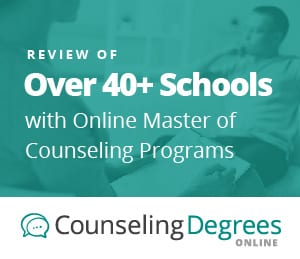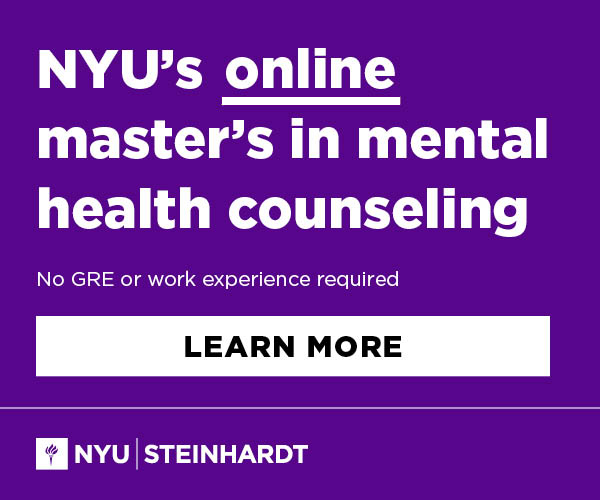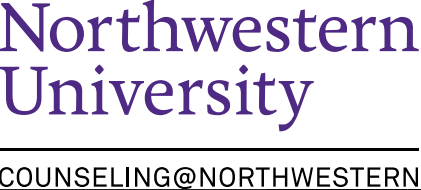 Northwestern University : Online MA in Counseling (CACREP Accredited)
Northwestern University : Online MA in Counseling (CACREP Accredited)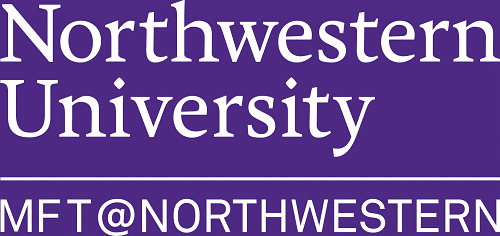 Northwestern University : Master of Science in Marriage and Family Therapy (Complete your COAMFTE-accredited MFT online program in as few as 21 months. No GRE required.)
Northwestern University : Master of Science in Marriage and Family Therapy (Complete your COAMFTE-accredited MFT online program in as few as 21 months. No GRE required.)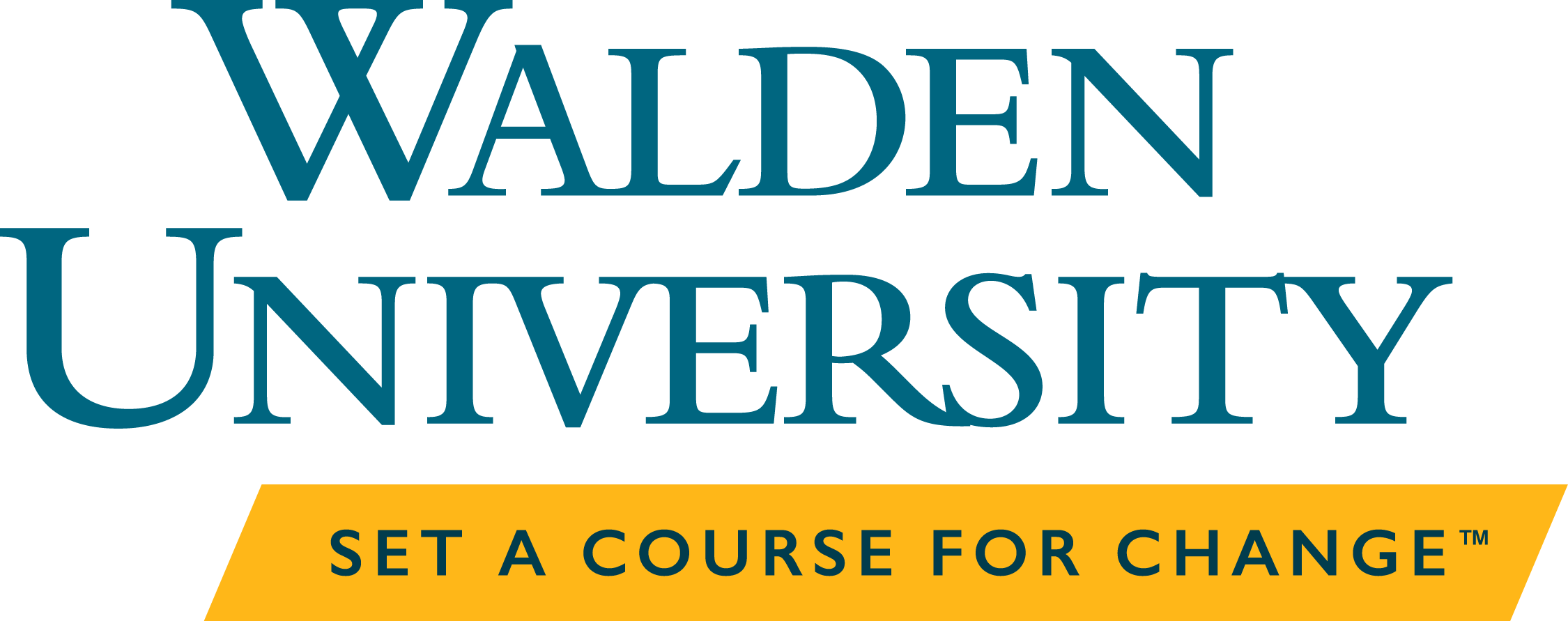 Walden University : BS in Psychology (HLC Accredited)
Walden University : BS in Psychology (HLC Accredited) Walden University : MS in School Counseling (CACREP Accredited)
Walden University : MS in School Counseling (CACREP Accredited) Walden University : MS in Clinical Mental Health Counseling (CACREP Accredited, six specializations to choose from)
Walden University : MS in Clinical Mental Health Counseling (CACREP Accredited, six specializations to choose from)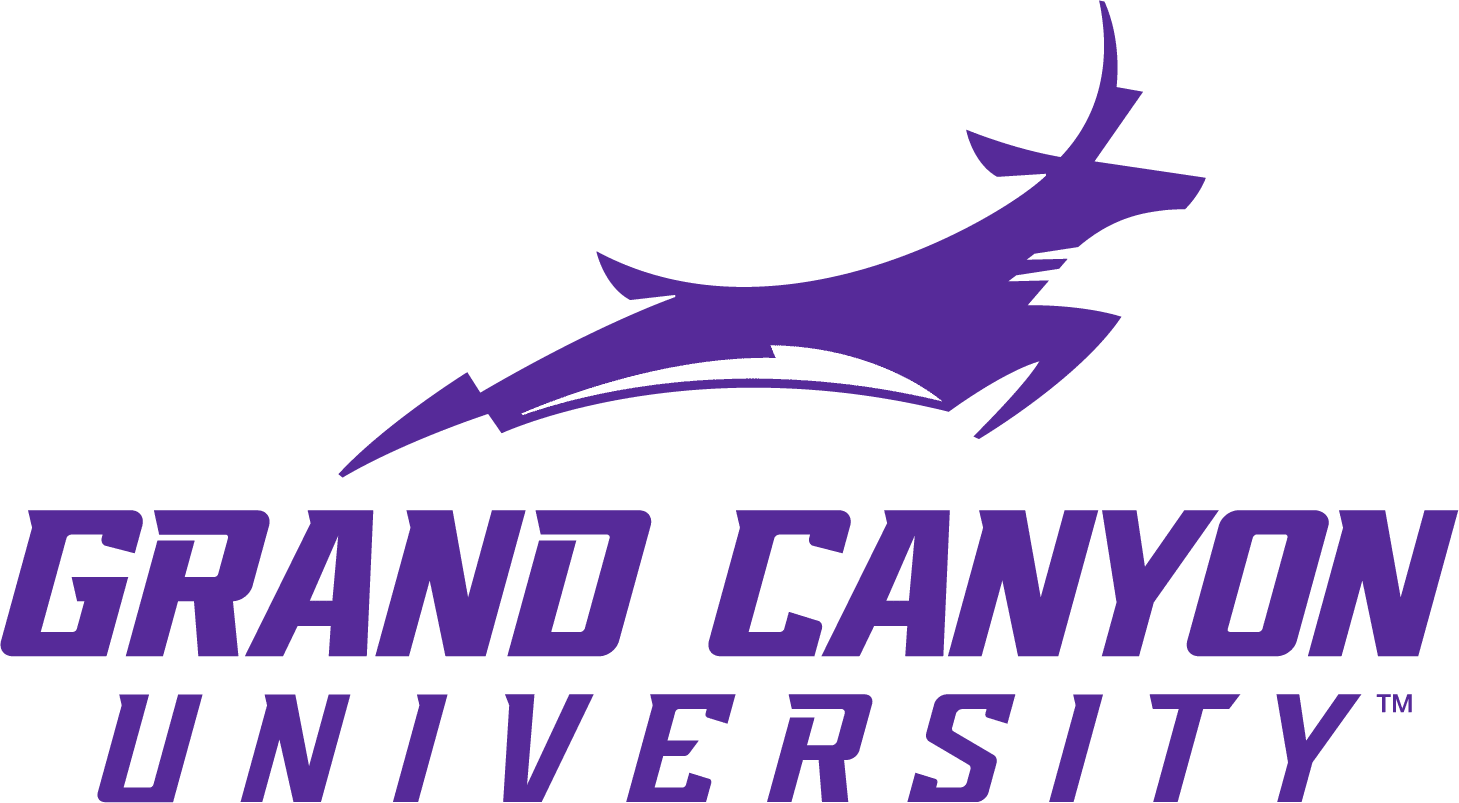 Grand Canyon University : Master's Degree in Counseling (As a private university, GCU has the same in-state and out-of-state tuition.)
Grand Canyon University : Master's Degree in Counseling (As a private university, GCU has the same in-state and out-of-state tuition.) Liberty University : MA: Clinical Mental Health Counseling (CACREP Accredited) (Online with required intensives)
Liberty University : MA: Clinical Mental Health Counseling (CACREP Accredited) (Online with required intensives) Southern New Hampshire University (SNHU) : Online Psychology Degrees (Bachelors and Masters. Flexible. Affordable. And achievable.)
Southern New Hampshire University (SNHU) : Online Psychology Degrees (Bachelors and Masters. Flexible. Affordable. And achievable.) The Chicago School : M.A. in Clinical Mental Health Counseling (Online Programs. CACREP Accredited.)
The Chicago School : M.A. in Clinical Mental Health Counseling (Online Programs. CACREP Accredited.)Whether you're a prospective student of counseling degree programs, or simply interested in learning more about counseling techniques, this article will give you a better understanding of the skills and approaches used in the counseling profession.
Consider a Featured Online Counseling Program
| School and Program Information | Online Program? Entry Requirements |
Course Information |
|---|---|---|
| Northwestern University
Online MA in Counseling
 CACREP Accredited CACREP Accredited |
✔ Online
GRE Not Required Bachelor's Required |
Prepare to pursue licensure in as few as 18 months Learn MoreFull-time, part-time, and accelerated track options available |
| Northwestern University
Master of Science in Marriage and Family Therapy
COAMFTE Accredited |
✔ Online
GRE Not Required Bachelor's Required |
The COAMFTE-accredited MFT@Northwestern is offered by The Family Institute at Northwestern University. Full-time students can complete the program in as few as 21 months. No GRE is required, but applicants must hold an undergraduate degree. Full and part-time tracks available. Learn More |
| Walden University
BS in Psychology
HLC Accredited |
✔ Online
|
Prepare to transform lives with a BS in Psychology from Walden University. Our program introduces you to a wide range of theories, approaches, and perspectives within the field while providing you with insight into issues affecting diverse individuals and social groups. Learn More |
| Walden University
MS in School Counseling
 CACREP Accredited CACREP Accredited |
✔ Online
GRE scores not required |
School counselors help students overcome obstacles and shape successful futures. Walden’s online MS in School Counseling program will give you a solid foundation in school counseling theories, approaches, and best practices while enabling you to gain hands-on experience. Learn More |
| Walden University
MS in Clinical Mental Health Counseling
 CACREP Accredited CACREP Accredited |
✔ Online
GRE scores not required |
Mental health counselors play a valuable role in helping people cope with life’s challenges. Walden’s online MS in Clinical Mental Health Counseling program can help you become the competent, compassionate counselor you know you can be. Learn More |
| Grand Canyon University
Master's Degree in Counseling
HLC and NASAC Accredited |
✔ Online
|
Clinical Mental Health Counseling master's degree emphases include: Childhood and Adolescence Disorders, Christian Counseling, Marriage and Family Therapy, and Trauma. Designed to meet the academic requirements of the National Board for Certified Counselors for the National Certified Counselor credential, the Certified Clinical Mental Health Counselor credential and the Arizona Board of Behavioral Health Examiners. As a private university, GCU has the same in-state and out-of-state tuition. Learn More |
| Liberty University
MA: Clinical Mental Health Counseling (CACREP Accredited)
 CACREP Accredited CACREP Accredited |
✔ Online
Online with required intensives |
Our CACREP-accredited master’s in counseling degree online can help you become an ethical, well-trained mental health counselor with the knowledge, values, and skills you need to empower others to make positive changes in their lives. Online and on campus. Training Champions for Christ since 1971. Learn More |
| Southern New Hampshire University (SNHU)
Online Psychology Degrees
Bachelors and Masters NECHE Accredited |
✔ Online
No application fee or GRE/GMAT scores required |
With our unique programs - from child and adolescent development to forensic psychology - you'll be prepared for a wide variety of careers in case management, research, human resources, youth services and social services. Learn More |
| The Chicago School
M.A. in Clinical Mental Health Counseling
 CACREP Accredited CACREP Accredited |
✔ Online
Bachelor's Degree Required. |
This online CMHC program prepares students for a career offering mental health services in a variety of settings; helping diverse clients through issues such as depression, anxiety, grief, low self-esteem, stress, relationship difficulties, and suicidal impulses. Learn More |
*Sponsored Counseling Programs
Online CACREP Accredited programs | Online MPCAC Accredited programs
Understanding the Basics of Counseling
Counseling is a professional relationship that empowers diverse individuals, families, and groups to accomplish mental health, wellness, education, and career goals. It is characterized by the application of various counseling skills and techniques, tailored to the client's unique needs and personal circumstances. Unlike other forms of psychological assistance that may focus more on diagnosis and treatment of mental illness, counseling emphasizes personal and interpersonal functioning across the lifespan.
At the heart of counseling are core skills that all practitioners must master to facilitate meaningful conversations with clients. Most are related to effective communication, the ability to empathize, and a willingness to uphold ethical standards that are the foundation of counseling practices.
 Northwestern University - Online MA in Counseling (CACREP Accredited)
Northwestern University - Online MA in Counseling (CACREP Accredited)
 Northwestern University - Master of Science in Marriage and Family Therapy (COAMFTE Accredited)
Northwestern University - Master of Science in Marriage and Family Therapy (COAMFTE Accredited)
 Walden University - BS in Psychology (HLC Accredited)
Walden University - BS in Psychology (HLC Accredited)
 Walden University - MS in School Counseling (CACREP Accredited)
Walden University - MS in School Counseling (CACREP Accredited)
 Walden University - MS in Clinical Mental Health Counseling (CACREP Accredited)
Walden University - MS in Clinical Mental Health Counseling (CACREP Accredited)
 Grand Canyon University - Master's Degree in Counseling (NASAC Accredited)
Grand Canyon University - Master's Degree in Counseling (NASAC Accredited)
 Liberty University - MA: Clinical Mental Health Counseling (CACREP Accredited) (CACREP Accredited)
Liberty University - MA: Clinical Mental Health Counseling (CACREP Accredited) (CACREP Accredited)
 Southern New Hampshire University (SNHU) - Online Psychology Degrees (NECHE Accredited)
Southern New Hampshire University (SNHU) - Online Psychology Degrees (NECHE Accredited)
 The Chicago School - M.A. in Clinical Mental Health Counseling (CACREP Accredited)
The Chicago School - M.A. in Clinical Mental Health Counseling (CACREP Accredited)
Counseling Versus Other Psychological Help
It’s important to distinguish counseling from other forms of psychological help. While clinical psychologists often deal with diagnosing and treating mental illness, counselors focus on enhancing personal and interpersonal functioning. This distinction underscores the counseling profession’s emphasis on growth, wellness, and career guidance, as opposed to the medical model’s focus on pathology.
Essential Counseling Skills and Techniques
Counseling skills and techniques vary widely, but they share the common goal of assisting individuals in better understanding themselves and finding effective solutions to their problems. These techniques are not one-size-fits-all but are adapted to suit the unique needs of each client.
Counselor Skills
The foundation of effective counseling lies in a set of universal skills:
Active Listening: A cornerstone of counseling, active listening goes beyond merely hearing the words spoken by clients. It involves fully engaging with the client, using verbal and non-verbal cues to show understanding, and providing feedback that validates the client’s feelings and perspectives. Active listening enables counselors to grasp the nuances of the client’s experiences, facilitating a deeper understanding and more effective support. Techniques such as summarizing what the client has said, reflecting on emotional undertones, and asking open-ended questions are vital components of active listening.
Empathy: Empathy in counseling is the ability to genuinely understand and share the feelings of the client. It requires a balance between emotional connection and professional detachment, allowing the counselor to be fully present with the client’s experiences while maintaining the capacity to guide the conversation constructively. Empathy helps in building a strong therapeutic alliance, which is the foundation of effective therapy. Demonstrating empathy involves acknowledging the client’s difficulties, validating their emotions, and expressing understanding in a compassionate manner.
Confidentiality: Confidentiality is paramount in counseling, ensuring that all communications between the counselor and the client are kept private. This ethical principle is essential for creating a safe and trusting environment where clients feel secure to share personal and often vulnerable information. Counselors must adhere to legal and ethical guidelines regarding confidentiality, including understanding the limits of confidentiality in situations where there is a risk of harm to the client or others.
Cultural Competence: Understanding and respecting cultural, ethnic, and individual diversity is crucial in counseling. Cultural competence involves being aware of one’s own cultural background and biases, understanding the client’s cultural context, and applying culturally appropriate counseling techniques. This skill is essential for effectively addressing and supporting the unique needs of diverse client populations.
Problem-Solving Skills: Counselors often help clients navigate complex personal and emotional challenges. Effective problem-solving skills involve helping clients identify problems, encouraging them to explore possible solutions, and supporting them in implementing those solutions. This process requires creativity, flexibility, and the ability to apply various therapeutic models to address the client’s specific needs.
Self-Reflection: The ability to reflect on one’s own practice, including recognizing one’s limitations, biases, and reactions, is vital for personal and professional growth in counseling. Self-reflection helps counselors to continually improve their skills, ensure they are practicing ethically, and maintain their emotional well-being. This ongoing process involves seeking feedback, engaging in supervision, and pursuing professional development opportunities.
Counseling Techniques
Counselors employ a variety of techniques to facilitate client growth and change:
Cognitive Behavioral Therapy (CBT) Techniques: CBT is a widely used approach that helps clients identify and challenge distorted or unhelpful thinking patterns and behaviors that contribute to emotional distress or problematic behaviors. Techniques include thought records to track and evaluate the accuracy of thoughts, behavioral experiments to test beliefs through action, and cognitive restructuring to replace negative thoughts with more balanced and realistic ones. CBT is effective for a range of issues, including anxiety, depression, and phobias.
Motivational Interviewing (MI): Motivational Interviewing is a client-centered, directive method for enhancing intrinsic motivation to change by exploring and resolving ambivalence. It involves the use of open-ended questions, affirmations, reflective listening, and summarizing to help clients articulate their reasons for change and the discrepancy between their current behaviors and broader life values. MI is particularly useful in substance abuse counseling and any scenario where resistance to change is a significant concern.
Solution-Focused Brief Therapy (SFBT): SFBT centers on helping clients develop a clear vision of their desired future and the steps necessary to achieve that future. Techniques include the miracle question, which asks clients to imagine a future where their problem is resolved, and scaling questions, which help clients assess their progress and identify resources. SFBT emphasizes clients’ existing strengths and resiliencies, making it a powerful approach for fostering quick and practical change.
Dialectical Behavior Therapy (DBT) Techniques: An extension of CBT, DBT focuses on teaching clients skills to manage painful emotions and reduce conflict in relationships. DBT is especially effective for clients with borderline personality disorder or those exhibiting self-harm behaviors. Techniques include mindfulness exercises to improve present-moment awareness, distress tolerance to cope with immediate stress, emotion regulation to understand and reduce vulnerability to emotion mind, and interpersonal effectiveness to navigate relationships more effectively.
Narrative Therapy: This technique centers on the stories that individuals construct about their lives, with the belief that these narratives shape one’s identity, problems, and solutions. Counselors using narrative therapy encourage clients to retell their stories in ways that make them more resilient or help them overcome challenges. Techniques include externalizing problems (viewing the issue as separate from the person) and identifying unique outcomes (instances where the problem did not dominate).
Gestalt Therapy Techniques: Gestalt therapy focuses on the present moment and encourages clients to experience their feelings and emotions fully. Techniques such as the empty chair (dialogue with an absent person or part of the self) and making the rounds (expressing thoughts or feelings to each group member) are used to enhance self-awareness and resolve unfinished business. This approach is effective for clients seeking to overcome feelings of incompleteness or unresolved emotional issues.
This foundational knowledge is essential for prospective students considering a career in counseling, providing a clear picture of what to expect from their educational journey and future professional endeavors.
Applying Counseling Skills in Professional Roles
A comprehensive understanding of counseling skills and techniques lays the foundation for success in various counseling professions. The U.S. Bureau of Labor Statistics outlines several key areas where these skills are particularly crucial. Let’s explore how they are applied across different professional roles within the counseling field.
School and Career Counselors and Advisors
School and career counselors and advisors play a pivotal role in guiding individuals through educational and career decisions. They utilize counseling skills to assess students’ abilities and interests, helping them develop academic and career goals. Active listening and empathy are crucial as they provide support during challenging transitions and decisions. These professionals often employ solution-focused brief therapy techniques to encourage students to envision and pursue a future that aligns with their strengths and aspirations.
Marriage and Family Therapists
Marriage and family therapists specialize in treating psychological and emotional issues within the context of the family system. They rely heavily on counseling techniques that foster communication, resolve conflicts, and improve relationship dynamics. Techniques such as active listening, empathy, and cognitive behavioral therapy are fundamental in helping families and couples work through their issues in a constructive manner.
Rehabilitation Counselors
Rehabilitation counselors assist individuals with physical, mental, developmental, or emotional disabilities to live independently. They apply counseling skills to develop treatment plans that address the personal, social, and professional needs of their clients. Empathy, motivational interviewing, and solution-focused techniques are vital in helping clients overcome obstacles and achieve their goals.
Substance Abuse, Behavioral Disorders, and Mental Health Counselors
This category of counselors focuses on helping individuals recover from addiction or modify problem behaviors. Counseling skills, particularly in motivational interviewing and cognitive-behavioral therapy, are critical for supporting clients through recovery and relapse prevention. These professionals must also maintain a high level of empathy and ethical standards, as they often work with clients in vulnerable states.
Psychologists
Counseling psychologists and school psychologists apply psychological principles and counseling skills to improve the mental health and educational outcomes of their clients. Techniques like empathy, active listening, and various therapeutic interventions are key to their approach. They work in diverse settings, from schools to private practices, addressing a broad range of issues from academic struggles to mental health conditions.
Each of these professional roles requires a unique combination of counseling skills and techniques, tailored to the specific needs of the individuals they serve. For prospective students, understanding these applications can inform their educational choices and career aspirations, guiding them toward a path that resonates with their interests and strengths.
Degree Programs Leading to Counseling Careers
Choosing the right degree program is a critical step for prospective students aspiring to counseling careers. Degree programs in counseling, psychology, and related fields provide the foundational knowledge and practical skills necessary for effective practice. Here, we explore how these programs prepare students for their future roles in the counseling profession.
Understanding Degree Options
Prospective students have several degree options, each tailored to different aspects of counseling and psychology:
- Bachelor’s Degrees: Programs such as a Bachelor of Arts (BA) or Bachelor of Science (BS) in Psychology, Counseling, or Social Work serve as entry points into the field. These programs introduce students to the basics of human behavior, psychological theories, and the fundamentals of counseling skills.
- Master’s Degrees: A Master of Arts (MA) or Master of Science (MS) in Counseling, Clinical Psychology, or Marriage and Family Therapy is often required for licensure in many counseling professions. These programs offer advanced coursework in counseling theories and methods, along with supervised clinical experience.
- Doctoral Degrees: A Doctor of Philosophy (PhD) in Psychology or a Doctor of Psychology (PsyD) prepares students for roles in research, academia, or advanced clinical practice. Specializations may include counseling psychology, school psychology, or clinical psychology.
- Example Degrees:
Coursework and Practical Experience
Degree programs combine rigorous coursework with practical experience to develop competent professionals. Key components include:
- Theoretical Knowledge: Students learn about psychological theories, counseling techniques, ethics, and the diverse needs of clients.
- Clinical Skills: Programs emphasize the development of counseling skills through practical exercises, role-playing, and supervised clinical practice.
- Ethics and Professional Standards: Understanding ethical considerations and professional standards is crucial for future counselors. Accredited programs ensure students are well-versed in these areas.
Accreditation and Certification
Accreditation is a critical factor in choosing a counseling degree program. Accredited programs meet the high standards set by professional organizations, ensuring that the education provided is both current and comprehensive.
For instance, the Council for Accreditation of Counseling & Related Educational Programs (CACREP) accredits master’s and doctoral degree programs in counseling.
- Example Degrees:
Post-degree, certification and licensure are essential steps towards becoming a practicing counselor. Requirements vary by state and specialty, but typically include completing an accredited program, passing a comprehensive exam, and fulfilling supervised clinical hours.
Relevance to Prospective Students
For prospective students, understanding the relationship between their degree program and their career aspirations is essential. Selecting the right program can set the foundation for success in specialized areas of counseling, such as marriage and family therapy, rehabilitation counseling, or school psychology.
It’s also important to consider the practical aspects, such as the program’s accreditation, the availability of internships, and opportunities for hands-on experience, which are invaluable in developing the counseling skills and techniques necessary for effective practice.
Developing Your Counseling Skills and Techniques
While formal education is crucial for laying the foundation in counseling and psychology, developing your counseling skills and techniques extends beyond the classroom. For prospective students and emerging professionals, actively engaging in opportunities to refine these skills is essential for career preparation and success. Here’s how you can continue to grow and develop your counseling competencies.
Engaging in Continuous Learning
- Workshops and Seminars: Regularly attending professional workshops and seminars can introduce you to new counseling methodologies and refine your existing skills. These forums offer the chance to learn from experienced practitioners and stay updated on the latest research and techniques in the field.
- Professional Journals and Publications: Subscribing to and reading professional journals, such as the Journal of Counseling & Development, allows you to gain insights into the theoretical and empirical foundations of counseling practices.
Practical Experience
- Internships: Participating in internships during or after your degree program provides hands-on experience with clients under supervision, allowing you to apply what you’ve learned in a real-world setting. This is invaluable for developing your counseling techniques.
- Volunteering: Volunteering at local community centers, schools, or mental health clinics can offer additional opportunities to practice your skills, particularly in active listening, empathy, and providing support.
Networking and Mentorship
- Professional Associations: Joining associations such as the American Counseling Association (ACA) or the American Psychological Association (APA) connects you with a community of professionals and peers. Networking with experienced counselors can provide guidance, support, and insights into various counseling careers.
- Mentorship: Seeking a mentor in the counseling field can offer personalized advice and feedback on your skill development. Mentors can share their experiences, offer career guidance, and help you navigate professional challenges.
Reflective Practice
- Self-Reflection: Regularly reflecting on your counseling sessions, reactions, and feelings can help you identify areas for growth. Reflection aids in understanding the impact of your own values, beliefs, and behaviors on your counseling practice.
- Supervision: Engaging in supervision, even after formal education, provides a platform for receiving constructive feedback on your counseling techniques and client interactions. It’s a space for reflection and learning from your experiences.
Embracing Technology
- Telecounseling Skills: With the rise of telehealth, developing skills in telecounseling has become increasingly important. Familiarize yourself with the technologies used in telehealth and understand the nuances of conducting counseling sessions remotely.
For prospective students looking towards a future in counseling, developing a robust set of counseling skills and techniques is a journey that combines education, practical experience, and continuous personal and professional growth.
By embracing opportunities for learning and development, you can ensure that you are well-prepared to meet the challenges and rewards of a career in counseling.
FAQs on Pursuing a Career in Counseling
Prospective students often have numerous questions about pursuing a career in counseling. One common inquiry is, “What degree do I need to become a counselor or therapist?”
To become a licensed counselor or therapist, you typically need a master’s degree in counseling, psychology, marriage and family therapy, or a related field. For more detailed information on the steps to becoming a counselor, including educational requirements and licensure, visit How to Become a Counselor.
What Degree Do I Need to Become a Counselor or Therapist?
To become a licensed counselor or therapist, you typically need a master’s degree in counseling, psychology, marriage and family therapy, or a related field. Programs should be accredited by recognized bodies, such as the Council for Accreditation of Counseling & Related Educational Programs (CACREP).
Bachelor’s degrees in psychology, social work, or related fields can serve as a foundational step towards this goal.
How Long Does It Take to Become Licensed in Counseling Professions?
The timeline to licensure varies depending on the degree program, state requirements, and the specific counseling field. After completing a bachelor’s degree, which usually takes four years, a master’s degree can take an additional two to three years.
Post-graduate supervised clinical experience requirements can range from 2,000 to 4,000 hours, potentially taking another two to three years.
Therefore, the entire process from undergraduate education to licensure can take approximately eight to ten years.
What are the Differences Between a Clinical Psychologist and a Counseling Psychologist?
Clinical psychologists typically focus on diagnosing and treating mental illness and psychological disorders. They often work in hospitals, mental health clinics, or private practice.
Counseling psychologists, on the other hand, focus on facilitating personal and interpersonal functioning across the lifespan. They deal with life stressors and issues, career guidance, and emotional and social health. Both paths require doctoral degrees, but their emphases and settings may differ.
How Can I Specialize in a Particular Type of Counseling?
Specializing in a particular area of counseling usually involves choosing relevant coursework during your degree program, gaining specific supervised clinical experience in your area of interest, and obtaining certification or licensure in that specialty.
Professional associations often offer additional certifications and continuing education opportunities to deepen your expertise in areas such as substance abuse, marriage and family therapy, school counseling, or rehabilitation counseling.
Understanding these aspects of pursuing a career in counseling is crucial for prospective students. Making informed decisions about your education and career path can help ensure that you are well-prepared for the challenges and opportunities that lie ahead in the field of counseling.
Charting Your Path in the Counseling Profession
Embarking on a career in counseling is a journey that requires thoughtful consideration, planning, and a commitment to personal and professional growth.
As you navigate through your educational journey and into your professional life, here are key insights to guide you in charting a successful path in the counseling profession. For an in-depth exploration of various counseling careers, consider consulting this comprehensive counseling career guide.
Reflect on Your Interests and Strengths
Begin by reflecting on your personal interests, strengths, and the type of impact you wish to have through your work. Counseling offers a diverse range of specializations, from school and career counseling to mental health and substance abuse counseling.
Consider what populations you feel most drawn to work with and the settings in which you envision yourself thriving.
Seek Guidance and Mentorship
Navigating the field of counseling can be complex, making guidance and mentorship invaluable. Seek out mentors who can provide insight into the profession, offer advice on educational paths, and share experiences from their own careers.
Professional organizations, such as the American Counseling Association (ACA) and the American Psychological Association (APA), are excellent resources for finding mentors and networking opportunities.
Prioritize Accredited Education and Training
Selecting an accredited degree program is crucial for ensuring the quality of your education and eligibility for licensure. Accreditation by organizations such as the Council for Accreditation of Counseling & Related Educational Programs (CACREP) signifies that a program meets the highest standards of the counseling profession.
Additionally, engage in opportunities for hands-on training through internships and practicums to gain practical experience.
Commit to Continuous Learning and Development
The field of counseling is ever-evolving, with new theories, techniques, and best practices emerging. Commit to continuous learning through workshops, conferences, and continuing education courses.
Staying informed about advancements in the field will enhance your skills and ensure that you are providing the best possible care to your clients.
Embrace Professional Challenges as Opportunities for Growth
The journey to becoming a counselor involves challenges, from rigorous academic work to the emotional demands of clinical practice. View these challenges as opportunities for growth, learning valuable lessons that will shape you into a compassionate and competent professional.
Plan for Licensure and Certification
Understanding the requirements for licensure and certification in your chosen specialty is essential. Plan ahead to ensure that you meet all educational, examination, and supervised clinical experience requirements. Licensure not only validates your qualifications but also opens the door to a wider range of professional opportunities.
Contribute to the Counseling Community
As you advance in your career, consider ways to give back to the counseling community. Whether through mentorship, research, or advocacy, contributing to the profession can be incredibly rewarding. It helps advance the field, supports the development of future counselors, and reinforces your commitment to the values of counseling.
Embarking on a career in counseling is a meaningful and fulfilling path. By thoughtfully navigating your education and career development, you can make a significant impact on the lives of individuals, families, and communities. With dedication, empathy, and a commitment to excellence, you can look forward to a rewarding career that reflects your passions and strengths.




